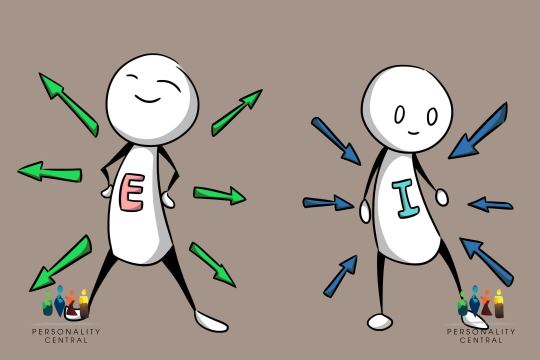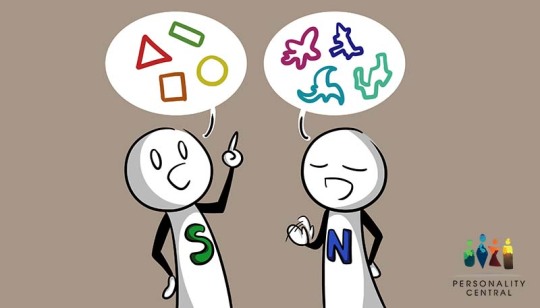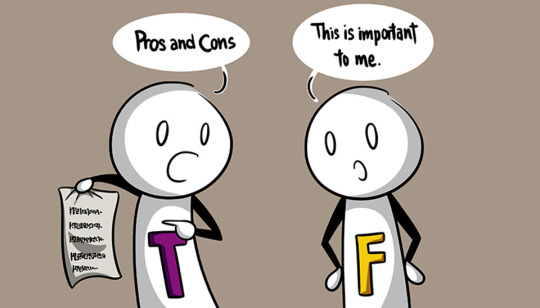dedicated to mbti! most original posts are just for fun and have no scientific basis (sorry intjs)
Don't wanna be here? Send us removal request.
Note
Who do you think are perfect matches for each type of MBTI? No judging, just curiosity. I'm asking multiple blogs for multiple opinions. It's for a project of mine.
Disclaimer: I really really really think that any type can get along well! This post is not the be all end all, and though based on a few studies, is mostly speculative!!
NFs are best matched with NFs that are the opposite E/I letter of them, like ENFPs with INFJs or INFPs. They also can be well matched with NTs.
SJs and SJs also get along super well! Marriage satisfaction rates of SJ x SJ relationships are the highest out of every type. SJs and SPs also get along well.
NTs are kind of tricky. I’d say NTs usually get along well with NFs. NT and NT also work well, but can tend to butt heads. A lot of INTPs start relationships with other INTPs, though! One exception to the NF/NT thing is ENTPs, who seem to really hit it off with ISFPs.
SPs vary a lot. They report highest marriage satisfaction rates with NTs, but a relationship between an ESFP and INTJ seems like it would have its fair share of challenges.
A rule I like to use for SPs (and all types occasionally) is just making sure there are at least two letters in common. For SPs, it doesn’t matter if they’re the two letters that make up the temperament. For NFs and SJs however, that seems to me like it could be a deal breaker.
Again, anyone can get along with anyone. There are no perfect matches and no pairing that’s doomed from the start. If you want to read more, check out this scholarly article about one of the studies that I based this post on.
10 notes
·
View notes
Text
Personal Update/In Search of New Admin
Hi everyone! Jenavieve here. I started this blog a few years ago and had a lot of fun making original posts and interacting with my followers. Since then, I got busy working as a camp counselor then started college (studying film production!) and have unfortunately not kept up with the blog. I recently logged back onto tumblr for the first time in a long time and saw a lot of messages from followers asking why I stopped posting, and asking other Myers-Briggs related questions. I’ve decided that I want to find a new blog runner! There’s a lot of people who are interested in this blog and I want to be able to keep providing them with dope content but simply don’t have the time. So, if you think you’d do an amazing job running this blog, message me and we can talk some more!
On a side note, if you want to see a little bit of what I’ve been up to and support a sister’s dream, please check out my YouTube channel!
6 notes
·
View notes
Text
ENFP Confession #111
The worst thing I can imagine is being called shallow. Especially by someone that I respect. It’s crazy how a happy & energetic outside can lead to the assumptions of not having any deep life experience.
300 notes
·
View notes
Text
Them: Whats that thing you like again? Myers briggs something?
Me:

8K notes
·
View notes
Text
Your Fave is Problematic: MBTI Style
So this might surprise you, but most of the biases and misconceptions within Jungian Typology aren’t Tumblr’s fault, they come straight from the biggest names in typology.



(Source) (Source)
1K notes
·
View notes
Photo








The cognitive functions as gifs.
3K notes
·
View notes
Conversation
mbti problems
watching movie: *typing characters*
talking to friends: *mbti mbti*
at restaurant: *typing waiter*
reading book: *functions everywhere*
life crisis: *mbti to explain reactions*
listening to music: *this is so isfp*
watching presidential debate: *guessing types*
sees a bird: *types it*
4K notes
·
View notes
Text
Does anyone know where I could find statistics about the percentages of each type in different countries? im really curious to see if and how they’d vary!!!!!!!!!!!!!!!!!!!!!!!!!!!!!!!!!!
52 notes
·
View notes
Text
ENFP Confession #97
You know it’s cool and all that a lot of movie protagonists are ENFP and all but in the real world people just think you’re dumb. I can’t count how many times people were surprised at my GPA or when I fix/solve a problem they can’t. Like ok man I’m scattered brained because I’m literally thinking about everything at once not because I’m stupid. Please pull your head out your booty hole.
609 notes
·
View notes
Text
MBTI Terms vs Conventional Meaning
One of the main problems with MBTI is that this theory uses rather common words to indicate types, but these MBTI “jargon” actually have completely different meanings from their conventional usage. This leads to misunderstandings of what the actual MBTI theory is about.
Moreover, most MBTI tests give you results based on percentages of I vs E, S vs N, T vs F, and J vs P. This creates a misunderstanding that the theory is based on the dichotomies between each letter pair, and that someone can be half J and half P, for example.
Let’s explore what MBTI terms really mean, and how they differ from the conventional meanings of these words, and the misinterpreted stereotypical/dichotomous “MBTI” meanings.

Introvert (I)
Introvert (conventional & stereotypical/dichotomous MBTI)
Someone who likes to spend time alone, preferring to be in their own room reading books
Someone who dislikes parties or any kinds of social gatherings
Probably shy and doesn’t talk much, may have social anxiety
Has few close friends, or, no real life friends
Has low energy
Introvert (MBTI)
Having a dominant introverted function (Ti, Fi, Ni, or Si)
A preference for focusing their energy inward e.g. tending to their own thoughts alone, analyzing themselves and their environment
A preference for formulating complete thoughts or theories on their own first before sharing them with other people
An MBTI introvert can be outgoing and sociable, but they still feel more at home being with their own thoughts and get worn out faster when interacting with people than extraverts
Extravert (E)
Extravert (conventional & stereotypical/dichotomous MBTI)
Someone who’s outgoing and a social butterfly
Loves parties
Has a large group of friends and large network of acquaintances
Great at networking and making new friends
Talkative and socially confident
Energetic
Extravert (MBTI)
Having a dominant extraverted function (Te, Fe, Ne, or Se)
A preference for focusing their energy outward e.g. interacting with the outside world by talking to others or taking actions and interacting with their surroundings
A preference for formulating their thoughts as they talk out loud to other people without having completely polished thoughts beforehand
An MBTI extravert can have social anxiety and dislike spending time with a large group of people, but they still have a preference of interacting with the outside world. An MBTI extravert may only prefer spending time with their few close friends, but they need to interact with those few close friends a lot to feel fulfilled and balanced.
Ambivert
Ambivert (conventional)
Someone who has both qualities of the conventional introvert and the conventional extravert in moderate amount
i.e. pretty much everyone on earth
Ambivert (stereotypical/dichotomous MBTI)
Someone who gets 50% E and 50% I on MBTI tests
Ambivert (MBTI)
This is a trick. It doesn’t exist in this theory.
Why? Because of each type’s thought process works based on 4 cognitive functions (out of 8). You can’t be half this type and half the other type because you’d have conflicting cognitive functions - i.e. constant cognitive dissonance with every single living thought, so you’d not be a functioning human (get the pun?).
For the more advanced MBTI enthusiasts: Yes, introverts and extraverts with the same last 3 letters have the same functions (e.g. INTP and ENTP), but you still can’t really be half-half because Ti-Ne and Ne-Ti approach the world differently. They experience different problems and stress factors (Ti-Si loop and Fe grip v.s. Ne-Fe loop and Si-grip).
If you don’t know what cognitive functions are, start with this.

Intuitive (N)
Intuitive (conventional)
Knowing something to be true without conscious reasoning or the need to go through information
“Women’s intuition”
Having an almost psychic ability to “get” people
Fluid intelligence (e.g. an intuitive learner)
Intuitive (stereotypical/dichotomous MBTI)
An intelligent, interesting person who gets all the funny jokes and subtle hints that people give
Imaginative, creative, artistic, explorative
Intuitive (MBTI)
Someone who prefers to use interpretations of information they receive from the 5 senses - e.g. possibilities of what these things could be, their theoretical usage, and what they relate to (Ne), or what these things symbolically represent and will become in the future (Ni)
A preference for discussing theoretical, abstract, symbolic topics
A preference to understand the global, overall picture before getting into details
Being an Intuitive does not equate being intelligent. There are plenty of boring Intuitives around. It depends on how you develop yourself.
Sensing (S)
Sensing (conventional)
Quite similar to the conventional meaning of intuition - having a feeling that there’s something going on beneath the surface (e.g. “I’m sensing something wrong here”)
Perceiving or becoming aware of something
Sensor (stereotypical/dichotomous MBTI)
An unintelligent, boring person who always misses hints and has no sense of humor
Bland, boring, dull, mediocre
Sensing (MBTI)
Someone who prefers to use direct information they receive from the 5 senses - e.g. what these things are and what I can use them for right now (Se), or what these things are and how they have been used effectively in the past (Si)
A preference for discussing practical, applicable, immediately relevant topics
A preference for learning details first, then building those details up to an overall picture
Sensors can be intelligent, creative, and artistic (yes, even SJs)

Thinking (T)
Thinking (conventional)
The process of considering or reasoning about something
Directing one’s mind towards something or someone
Thinking (stereotypical/dichotomous MBTI)
Someone who thinks a lot
Making decisions based on logic and rationality
Someone who is calm and intelligent
Someone who is robotic and stoic, and doesn’t have any emotions
Someone who is doing something technical like hard sciences and maths
Like a stereotypical man
Thinking (MBTI)
A preference for making decisions based on facts, truth and logical analysis (Ti), rationality and empirical evidence (Te)
MBTI Thinkers can learn to be considerate and not offensive to others, especially if their feeling function is in the tertiary position.
MBTI Thinkers have emotions, and can act emotionally/irrationally, especially in times of stress or if immature
MBTI Thinkers are not automatically good at science and math, and may not even like those subjects. They can be amazing artists and musicians.
Feeling (F)
Feeling (conventional)
An emotional state or reaction
Experiencing an emotion or sensation
Feeling (stereotypical/dichotomous MBTI)
Someone who feels a lot and doesn’t think a lot
Making decisions based on emotions
An emotional person; someone who’s dramatic, may be animated, sweet, and nice
Most likely unintelligent, not academic, and incapable of logical thinking
Someone who is doing something involving arts, languages, or humanities
Like a stereotypical woman
Feeling (MBTI)
A preference for making decisions based on what is morally just, personal ethics (Fi) or keeping social harmony (Fe)
MBTI Feelers can be logical, think empirically, good at science and math, and do not act emotional
MBTI Feelers can be bashful and inconsiderate, especially if immature or under stress

Judging (J)
Judging (conventional)
Forming an opinion or conclusion about something
Being judgmental; determining whether qualities someone or something has are correct or desirable
Judging (stereotypical/dichotomous MBTI)
Someone who is organized, responsible, structured, neat, clean, tidy
Someone who is always on time
Someone who loves schedules and needs to plan ahead
Judging (MBTI)
Having a dominant (if extraverted) or auxiliary (if introverted) extraverted judging functions (Je) - Te, Fe
Judgers can be messy, spontaneous, and always late (especially in leisure). These are learned behaviors/habits. Their external behaviors do not dictate their MBTI (i.e. thought process).
Perceiving (P)
Perceiving (conventional)
The way the brain processes external information through the 5 senses
Becoming aware of something
Interpreting something in a particular way
Perceiving (stereotypical/dichotomous MBTI)
Someone who is messy, scattered, disorganized, lazy, unreliable
Someone who is always late
Someone who is easy going and always go with the flow
Someone who is spontaneous and loves surprises
Perceiving (MBTI)
Having a dominant (if extraverted) or auxiliary (if introverted) extraverted perceiving functions (Pe) - Ne, Se
Perceivers can be outwardly organized, tidy, and always on time (especially in the work place or if they grew up in that environment). These are learned behaviors/habits. Their external behaviors do not dictate their MBTI (i.e. thought process).

If you want to know more about MBTI, visit MBTI Resources - a compilation of the well-written, informative, and accurate articles on the web.
-eilamona
(images source)
14K notes
·
View notes
Text
Django Unchained: Dr. King Schultz [ENTP]
UNOFFICIAL TYPING by jacobsloaner

Extroverted Intuition (Ne): Dr. King Schultz is eager to change lifestyles on the fly. He goes from being a dentist, to taking a job as a bounty hunter, to taking on an adventure with a slave to help him find his wife. Alternative plans come to Schultz naturally. He finds a way to indirectly free Django’s wife by pretending to have interest in purchasing an expensive Mandingo fighter from her owner. He draws parallels between Django’s life and German mythology.

Introverted Thinking (Ti): Justifying his bounties using the law is something that Schultz does with ease. Schultz eloquently explains bounty hunting to Django and makes sure to use precise language. He revises plans on the fly when in a jam and is quick to point out logical inconsistencies when in conflict. When Django is hesitating to kill a man that’s with his son, Schultz explains that it’s logical because he is wanted for the crime of stagecoach robbery.

Extroverted Feeling (Fe): When he sees that Calvin Candie has a book written by a black man, Schultz points out that he probably wouldn’t approve of how Candie treats slaves. His compassion not only is strong for Django, but reaches out to all slaves being treated poorly. Charming a plantation owner as part of a larger plan is Schultz’s specialty. He shows an understanding social graces such as when he politely tells Django to take his hat off the table.

Introverted Sensing (Si): Though the past doesn’t play a big part into his life, he remembers his German ancestry and talks to Django about it. Schultz educates him on the stories that he was taught growing up even though he struggles to remember specific details. Sometimes he uses German phrases from his past that English speakers can’t understand. Schultz can be knowledgeable on facts such as details on authors.
120 notes
·
View notes
Text
How I explain MBTI: “Yeah well MBTI is an advanced psychological theory that takes into account data about human processing and the cognitive functions of the brain to categorize the human race into sixteen types”
What my friends think it is: “Oh that weird thing you obsess over, you told me I’m an IKEA or something”
Actual MBTI posts on tumblr: The Types as Bread
5K notes
·
View notes
Note
Who would you say are the most 'extroverted introverts'? :)
From my own experience I think ISFJs and INFJs are probably the most extroverted, but it varies person to person!!
31 notes
·
View notes
Text
How to tell if an INFJ likes you
- I listen to you intently - I smile at you from across the room - I stare deep into your soul when you speak to me - I laugh at all your jokes - I invade your personal space or make any excuse to be physically near you - I poke fun at you - I act nervous around you - I try to hide the fact that I’m nervous around you - When I’m not speaking to you, I avoid all eye contact - I act and speak of you as though I have no interest in you whatsoever - In other words, it’s impossible to tell
2K notes
·
View notes
Text
The Types as Logical Fallacies
INFP: Ad Hominem, Black-Or-White
INTP: Strawman, The Fallacy Fallacy
ENFJ: Appeal to Emotion
INFJ: Slippery Slope, False Cause
ISFP: Tu Quoque, Appeal to Nature
ESFP: Personal Incredulity
ISTJ: Special Pleading, Burden of Proof
ENFP: Loaded Question, Middle Ground
ENTP: Ambiguity
ESTP: The Gambler’s Fallacy
ESFJ: Bandwagon
ESTJ: Appeal to Authority
INTJ: Begging the Question
ENTJ: The Texas Sharpshooter
ISTP: Composition/Division
ISFJ: No True Scotsman, Anecdotal
Source
1K notes
·
View notes
Conversation
MBTI Onion Articles
INTP: Astronomers Just Going To Go Ahead And Say Dark Matter Nitrogen
ENTP: Man Who Plays Devil's Advocate Really Just Wants To Be Asshole
ENTJ: Wal-Mart Announces Plan To Slash Customers’ Throats
INTJ: NASA Completes 52-Year Mission To Find, Kill God
INFJ: I Know What Is Best For Everyone
ENFJ: God Angrily Clarifies ‘Don’t Kill’ Rule
ENFP: Dog Experiences Best Day Of His Life For 400th Consecutive Day
INFP: Guy In Philosophy Class Needs To Shut The Fuck Up
ISFP: Hippie Will Tell You What The Real Crime Is
ESFP: Roof On Fire Claims Lives Of 43 Party People
ESFJ: Not Knowing What Else To Do, Woman Bakes American-Flag Cake
ISFJ: Man On Cusp Of Having Fun Suddenly Remembers Every Single One Of His Responsibilities
ISTJ: ‘I Am Under 18’ Button Clicked For First Time In History Of Internet
ESTJ: Supreme Court Rules Death Penalty Is 'Totally Badass'
ESTP: NASCAR Coach Reveals Winning Strategy: 'Drive Fast'
ISTP: Breaking News: Some Bullshit Happening Somewhere
536 notes
·
View notes
Note
My sister is an ENFP and I'm an INFP you guys rock! 🙌🏽💜
Thank you!!! I try really hard to make posts that involve or interest all the types, but i feel like i always end up kind of catering to NFPs by accident so im glad at least you guys appreciate it :))
17 notes
·
View notes